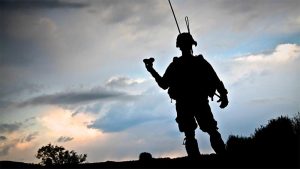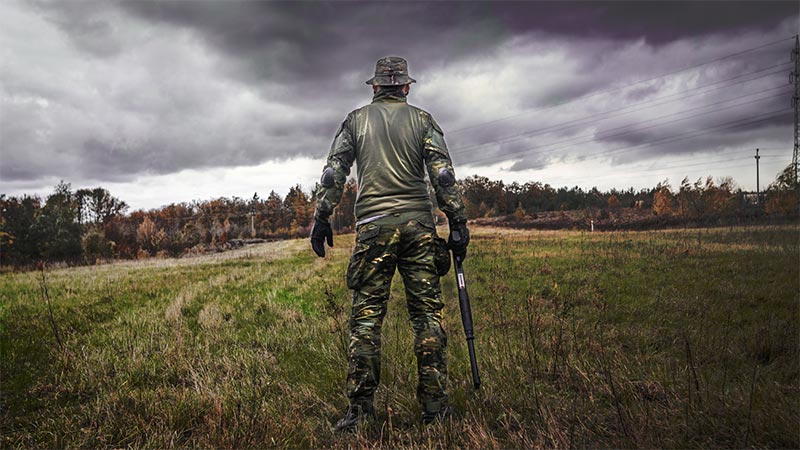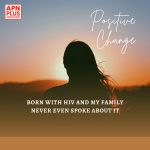His name is Yudha, which means war. He was a former Indonesian military officer. He never thought that his HIV status would instantly change his life, not because his productivity had decreased due to some HIV-related illness. In fact, when he was dismissed, it was around the time when his performance graph was increasing.
Yudha was born and raised in a military family and environment. His parents and most of his family members were members of the military and the police force. This had a big influence on him: his dream was to also serve and defend his country in the military, just like the rest of his family. After graduating from high school, he tried to join the military to become an army soldier but failed the tests. He never gave up and tried to join the military one more time, this time preparing physically, mentally and academically in order to meet the requirements and be qualified. Finally, he was enlisted in the military and became in charge of field artillery or ballistic weapons such as cannons and rockets.
He excelled as a soldier in the armed forces, both while in training and after graduating and becoming an officer. He slowly rose through the ranks. He was one of four military officers assigned to go to Brazil to study rockets and new weapons. After returning from Brazil, he was assigned to train the other soldiers throughout Indonesia to use these new weapons.
In 2018, he was given another assignment to maintain the national security for the Papua region. And this was where his life began to make a dramatic change.
“Before leaving for Papua, I was given information regarding basic knowledge about HIV prevention because Papua is a concentrated epidemic area. After that we did mass HIV testing and that’s when I found out about my HIV status. I was summoned by the military commander. I was interrogated regarding my various activities in Brazil. At first, I thought the commander would ask me about my achievements in Brazil, but in the end the questions led to what caused my HIV infection and what were my sexual behaviors”.
When he found out about his HIV status, he was in denial. He went to get an HIV test in several other health centers hoping the first test was false positive, but the results did not change anything. Eventually, the news about his HIV status spread to high-ranking military officers. This sharing of private health data is normal in the military unlike among civilians where HIV diagnosis is private and protected.
Because of his HIV status, Yudha was canceled from serving in Papua, and the treatment he received changed, such as not being able to hold a gun on the grounds that his commanders were worried that he would become depressed and commit suicide. In addition, he was also not given heavy tasks, and his commanders asked him not to exercise too much, to refrain from getting tired or to sweat a lot, and not to get injured or bleed. In military doctrine, this condition means that he is essentially a useless soldier. Yudha was made to feel worthless when he was not given any proper military tasks anymore. After self-evaluation, he realized that he was slowly being removed from military duty.
True to his expectations, the removal of tasks became the grounds for Yudha’s dismissal as a military officer. However, he believes he was dismissed because he was a gay person living with HIV. Six months after his HIV diagnosis, in which he was mostly kept in isolation from his colleagues, he was again interrogated regarding his sexual orientation by the Intelligence Division. He was urged to tell the truth and promised to be given protection, until he finally opened up about his identity as a gay person. However, it turned out that the conversation had been recorded. Finally, he was summoned by the military police who, using the minutes of the interrogation, carried out the process for his dismissal.
“I fought to defend everything. I accepted the dismissal decision after being isolated for sixteen months, going through the trial process at the military court, and appealing the decision. The third and final decision was dishonorable dismissal, because I was considered to have violated an order from my superiors for having a different sexual orientation.”
The dismissal was based on the commander’s regulation “Telegram Letter Number ST/398/2009 Article 53 Paragraph 2 concerning the administration of Indonesian military soldiers”. In this regulation, a military soldier who commits an immoral violation of the same sex (i.e., homosexuality) according to the consideration of the authorized official cannot be defended to remain in the soldier’s service. The court determined that that a person’s homosexual behavior is what causes a person to be infected with HIV, and being infected with HIV is therefore considered to endanger other soldiers.
“I was in solitary confinement because I was HIV positive. It was not easy to be a prisoner in isolation. The stigma and discrimination there were very high. I was not treated like a human being. Many people kept their distance from me, so in the end I became afraid of other people. I feel a bit of grudge about everything that happened to me. I once told my seniors in the military that in their eyes, I may have made a big mistake (by being gay), but they have made a mistake by dismissing me and losing one of their best warriors”.

Positive Changes
Currently Yudha is still in the process of coming to terms with the circumstances he has been through. He is still traumatized and often has nightmares. But the thing that is helping him cope through with the situation is working with the Indonesian Positive Network (JIP), a national organization that works for the rights of people with HIV/AIDS in Indonesia. He currently works as a program officer for JIP. He considers JIP a very supportive place, an environment that never judges someone’s capability based on their sexual orientation and HIV status. At JIP, he feels respected and treated like a human being. He no longer needs to pretend to be someone else. For him, this acceptance from his work peers and being in a supportive environment are what allows him to heal and from the nightmare that he has been through in the military.
Now armless with military weapons, but armed with knowledge about HIV/AIDS and his rights, Yudha is fighting a different battleground: the war against stigma and discrimination against people living with HIV (PLHIV) and other oppressed key population groups.
For Yudha, the first battle is changing discriminatory laws against gay men and PLHIV in the military. There are currently military regulations in Indonesia that discriminate against PLHIV solders, considering them as having a dysfunctional health status that is risky to other military personnel. Yudha believes that the Indonesian military must follow existing HIV/AIDS literacy from the Ministry of Health of the Republic of Indonesia or the World Health Organization (WHO) and change the belief that military personnel with HIV are not functional just because of their HIV status; that they too can fulfill military functions and serve their country.
Yudha believes the Indonesian military is always keeping abreast of advanced military weapons and technologies that are coming from Western countries such as the US. However, the Indonesian military is not aware of the rights-based approach of Defense Departments in Western countries, including their equal opportunities program to protect their service personnel against discrimination based on their sexual orientation or gender identity (SOGI). In Western countries, the military supports and protects the fight and struggle of lesbian, gay, bisexual, transgender, intersex, queer, asexual and others (LGBTIQA+) for equality. They believe that LGBTIQA+ and PLHIV can serve in the military.
“One day, I want to represent Indonesia to speak at an international forum and bring up this issue. I want the Indonesian military to realize that the current policy is wrong. I will always respect and protect my country, even if they don’t do it to me. But I need to do something to change this discriminatory policy and bring about a better change for everyone”, Yudha says.
Contributor: Davi Ardiansyah
Editor: Nikos Dacanay





